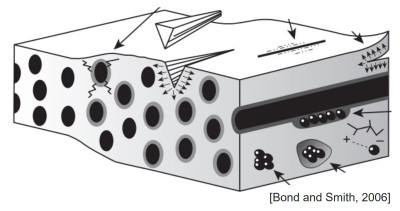News
Queen Mary Researchers develop a new model to understand the moisture-induced degradation of composite materials, impacting the offshore energy community.
25 April 2023

Exciting news! Our latest research on environmental-assisted modelling of composite materials has just been published in a top-tier journal: Engineering with Computers (Q1, IF=8.083).
Due to their high strength-to-weight ratios and corrosion resistance, lightweight composite materials have found widespread use in aerospace, wind, and marine structural applications. However, these materials are highly susceptible to environmental conditions, including moisture and temperature.
In this work, we present a new framework for modelling moisture-induced degradation in composite materials using a phase field-based multi-physics approach. The framework takes into account the diffusion of moisture, hygroscopic expansion, mechanical and fracture behaviours of the matrix, fibres, and matrix-fibre interfaces. We also propose a novel diffuse interface approach to interpolate relevant properties along the fibre-matrix interface.
Our theoretical framework is implemented numerically using the finite element method, and numerical experiments are conducted at micro-, meso-, and macro-scales to gain insight into moisture-material interactions. We found that concentration gradients can result in hygroscopic strains and damage accumulation at the fibre-matrix interface, and that the fibre distribution plays a secondary role in material parameters and conditions assumed.
Our research provides a comprehensive multiscale virtual tool for understanding the environmentally-assisted degradation of composite materials. We are excited to share our findings with the engineering community and hope that our work will inspire further research in this important area.
This work was led by our MSc student Kit Au-Yeung (very impressive!) in collaboration with Emilio Martínez Pañeda, PhD and Adrià Quintanas Corominas at Imperial College London.
Check out the open-access article: https://rdcu.be/daEqw. The preprint is also available: https://lnkd.in/eXqdD3nq.
| Contact: | Wei Tan |
| People: | Wei TAN |
| Research Centres: | Intelligent Transport Sustainable Engineering |
Updated by: Wei Tan




